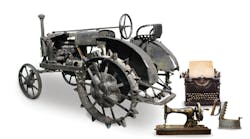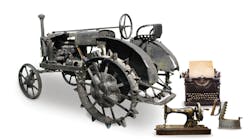Are you a dental dinosaur? A little knowledge can help brush away feelings of burnout
By Suzanne Hubbard, RDH
I met with a colleague for coffee and conversation and we discussed our dental hygiene careers. Frustrated, she said that she felt like her career was dying. As we sat discussing our similarities and differences in our respective careers, I could tell she was growing even more frustrated. She turned to me at one point and said, "I think I might be a dental dinosaur!" I laughed and asked her what she meant. She said that she felt like everyone was moving on in their careers while she felt stagnant.
I appreciated her willingness to be open, honest, and vulnerable. She continued to talk, and as she did I wondered if she was finished with her career. Was she burned out? Was she looking at another career? She talked of feeling stuck and not thriving in her career. But these five points gave validity to her dinosaur analogy.
- But I've always done it this way.
- I haven't gone to continuing education in four years.
- Yes, I take shortcuts; there isn't enough time.
- I don't belong to any dental organizations.
- No, I don't research. That's the dentist's job.
As we talked more, my friend said, "I've always done it this way." She was talking about a particular OSHA habit. She didn't know it was an incorrect OSHA procedure, because this was how her office had always done it. Everyone from the assistants to the hygienists was following an incorrect OSHA protocol. Because everyone was doing it, they all fell into the dinosaur mentality. It wasn't until they held an in-office OSHA training that the staff learned of their error.
Then my friend and I discussed periodontal measurements. She said that she didn't record periodontal measurements if they remained the same over the years. But her records showed that the last time she probed was in 2010 for baseline measurements when a patient was deemed "new to the practice." She was not aware that for standard of care a paper trail of health and/or disease needed to be established, just like weight and temperature for those arriving for a doctor's appointment.
She asked, "How are you getting your information? Things in dentistry are changing so fast and my doctor really doesn't know what is new." Changes in dentistry happen almost daily with new protocols, new products, and guidelines. I soon realized she had let her continuing education courses slip and hadn't been to a class in years. As a wife and mother of two young boys, she was busy working and maintaining a household. Luckily there are avenues for her to research to take the much-needed continuing education to stay up-to-date in her field.
She realized during our conversation that dental professionals shouldn't rely on their employers for continuing education. Many times employers are the elephant in the room or, in other words, the dental dinosaur, when it comes to CE. Our responsibility lies in educating ourselves, and sometimes that means a financial or time sacrifice to get the correct information. We will become better clinicians for it!
My friend also mentioned that she was considering joining her professional association, but it was costly and she didn't feel it did much for her professionally. I would have agreed with her early in my career, but I've found that the professional organization is my best resource and best use of my dollars. After talking with her, my friend realized just how far our profession has come and how far it will take us. The cost to join is small considering all the legislation, inner workings, and those working on my professional behalf in the organization.
I was thankful my friend was able to be honest about where she was in her career. Her dental dinosaur analogy was spot on as she said that, in essence, she was buried under dirt! I could just envision it, her hand with a scaler in it, a fossilized version of her dental hygiene career on display at a museum.
At first I thought she was burned out, but burnout is different than a dental dinosaur. She still loves what she does, so she just needed a little dusting off. It made me think of dinosaur bones. When they're discovered, archeologists take a very light brush and carefully remove the dirt and debris to expose them, careful not to disrupt anything. The process is careful, deliberate, and precise. Furthermore, it is slow. Change isn't easy, and old habits die hard. Awakening the dental dinosaur is a process.
I met with my friend again recently and she has taken some courageous steps toward change. She joined several dental groups, and now helps with a dental advisory board. She joined her local dental hygiene component, and feels she now has a better pulse of the dental hygiene community. She accepted an accountability partner at her work who will keep her in check, and her entire demeanor has changed. She is no longer buried. She said she will take no more shortcuts and no longer provide substandard care. She feels more alive than ever. She just needed a little dusting. We all need that every now and then! RDH
Suzanne Hubbard, RDH, owns a low-income clinic, Hubbard Family Dental Clinic, in Greeley, Colorado.

